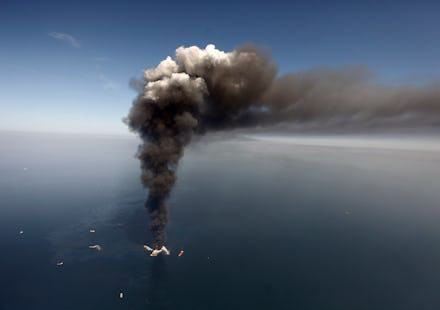Finally, Some Justice in the 2010 BP Gulf Oil Spill

A federal judge has harshly condemned BP for "recklessness" and "gross negligence" during the 2010 Deepwater Horizon oil spill, potentially exposing the company to an astonishing $18 billion in fines.
The New York Times reports that U.S. District Court Judge Carl J. Barbier ruled that while rig owner Transocean and service company Halliburton played a role in the accident, it was clear that the vast majority of the blame lies with BP. Barbier's 153-page decision highlights how rig crew members repeatedly noticed and reported problems with the well's construction, but BP's response was "primarily driven by a desire to save time and money, rather than ensuring that the well was secure."
Altogether, the court ruled that 67% of the blame laid with BP, 30% with Transocean and just 3% with Halliburton. Bloomberg reports that BP shares fell 5.3% on the news, and the oil giant may now be liable beyond the $18 billion in potential fines. The full amount BP could ultimately pay is still unclear, as Barbier has yet to issue a final decision on how much oil was spilled from the well. BP has already been charged $42 billion for the accident.
The background: This is just desserts for BP, which has repeatedly tried to downplay the extent of the spill and limit its liability for the accident. A catastrophic blowout on the Deepwater Horizon well on May 20, 2010, leaked millions of gallons of oil directly into the Gulf of Mexico and killed 11 employees, at which point BP was already $60 million in the red and 54 days behind on the well's construction.
Employees allege that BP ignored a number of safety warnings, while a manager told investigators that BP had rubber-stamped the "squirrely" results of a negative pressure test to ensure the well's integrity. Transocean skimped on maintenance, crew training and safety systems. Halliburton's cement work was also allegedly defective. When the well blew, all three companies blamed each other in an effort to duck public scrutiny and legal liability. BP told Barnier that the accident was the result of multiple mistakes by individuals rather than corporate negligence.
Even as the spill disrupted millions of peoples' lives, did untold damage to the Gulf ecosystem and caused damages in the tens of billions, from Day One BP was primarily concerned with evading the pitchforks. BP has been accused of deliberately "low-balling" the extent of the spill, releasing public assessments two to four times lower than the actual flow rate coming from the broken rig. NOLA.com reports that as many as 200 million gallons of oil may have escaped into the Gulf, and while many of the area's ecosystems are now rebounding, scientists say they might not be able to account for as much as one-third of the oil.
"The court has now laid bare the full extent of the level of BP's misconduct," said claimant lead attorneys James Roy and Stephen Herman. "We hope that today's judgement will bring some measure of closure to the families of the 11 men who tragically lost their lives, and to the thousands of people and businesses still trying to recover from the spill."
Why you should care: The National Audubon Society issued a statement shortly after the ruling was announced, with president David Yarnold saying, "BP will finally be forced to pay what it owes to fix what it broke. It is a long-awaited step toward healing and recovery for the Gulf Coast, its birds and its people. BP said it was above the law; Judge Barbier said the law applies to everyone, even multinational giants."